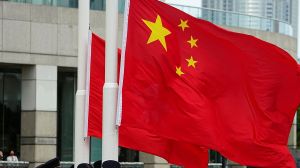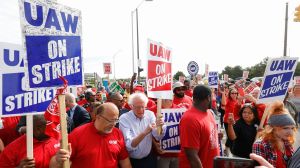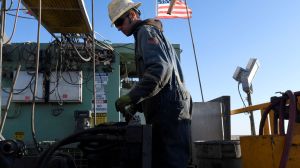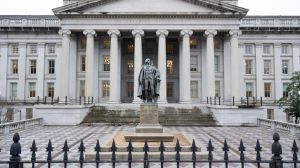Search
- All
- News
- Opinion
- Commentary
- Media Miss

China is grappling with a range of challenges, including political, economic, and demographic issues. Youth unemployment rates are rising while fertility rates are declining, and banks are predicting a slowdown in economic growth. China’s economy is also feeling the effects of tech companies relocating and product bans being imposed by other countries. Straight Arrow News…

A historic strike begins as autoworkers and Detroit’s three big car companies fail to come to an agreement. And NASA releases its findings after a yearlong study into UFOs. These stories and more highlight The Morning Rundown for Friday, Sept. 15, 2023. Autoworkers go on strike against Detroit’s Big 3 For the first time ever, the…

United Auto Workers are striking against Detroit’s Big Three automakers at the same time for the first time. The impact could be financially devastating. Economists estimate 10 days on the picket lines against General Motors, Ford and Fiat Chrysler-parent Stellantis could cost the U.S. economy $5.6 billion and push Michigan into a recession. Strikes can…

General Motors, Ford, and Stellantis in Detroit are facing a potential strike by the United Auto Workers (UAW) union. If an agreement is not reached by 11:59 p.m. on Thursday, Sept. 14, it could result in the largest U.S. strike by active employees in 25 years. A Cornell study and NPR reporting indicate union strikes…

The COVID-19 pandemic shook the world in March 2020, reshaping major political institutions, global economies and entire societies. It also thrust public health into the spotlight of social, cultural and political debates. COVID-19 case counts are rising again. It remains an open question how societies will choose to respond this time around, now that they…

United Auto Workers–the union representing workers at General Motors, Ford and Stellantis in Detroit–must reach a labor agreement with the automakers before a potential strike. If no agreement is reached by 11:59 p.m. on Thursday, Sept. 14, 140,000 workers could begin to strike. The strike could turn into the most significant strike of active employees…

Countries provide subsidies to industries they consider vital for their economies or national infrastructure. For instance, Taiwan, Korea and Japan offer subsidies to their semiconductor sectors, while Russia invests heavily in its energy industry, and China supports advanced manufacturing and high-tech industries. As a result, the United States has become overly dependent on specific countries…

Economist Paul Krugman recently said that interest payments on U.S. debt won’t be a major concern in the years ahead. The U.S. national debt is almost at $33 trillion, and the interest payments alone on that debt are approaching $500 billion per year. Straight Arrow News contributor Larry Lindsey disagrees with Krugman and instead urges…

In recent years, U.S. banks invested billions of American dollars into China, taking advantage of the world’s second-largest economy as it continued to open up its $50 trillion financial market. Now, as the relationship between the U.S. and China has deteriorated, banks are considering reducing their involvement in a country that appears to be increasingly…
Welcome back to trustworthy journalism.
At Straight Arrow News, we…
Report without partisan spin, earning distinctions from media bias experts at AllSides and Ad Fontes Media


Adhere to the highest standards for reporting transparency and credibility, as proven by NewsGuard’s 100/100 reliability rating






